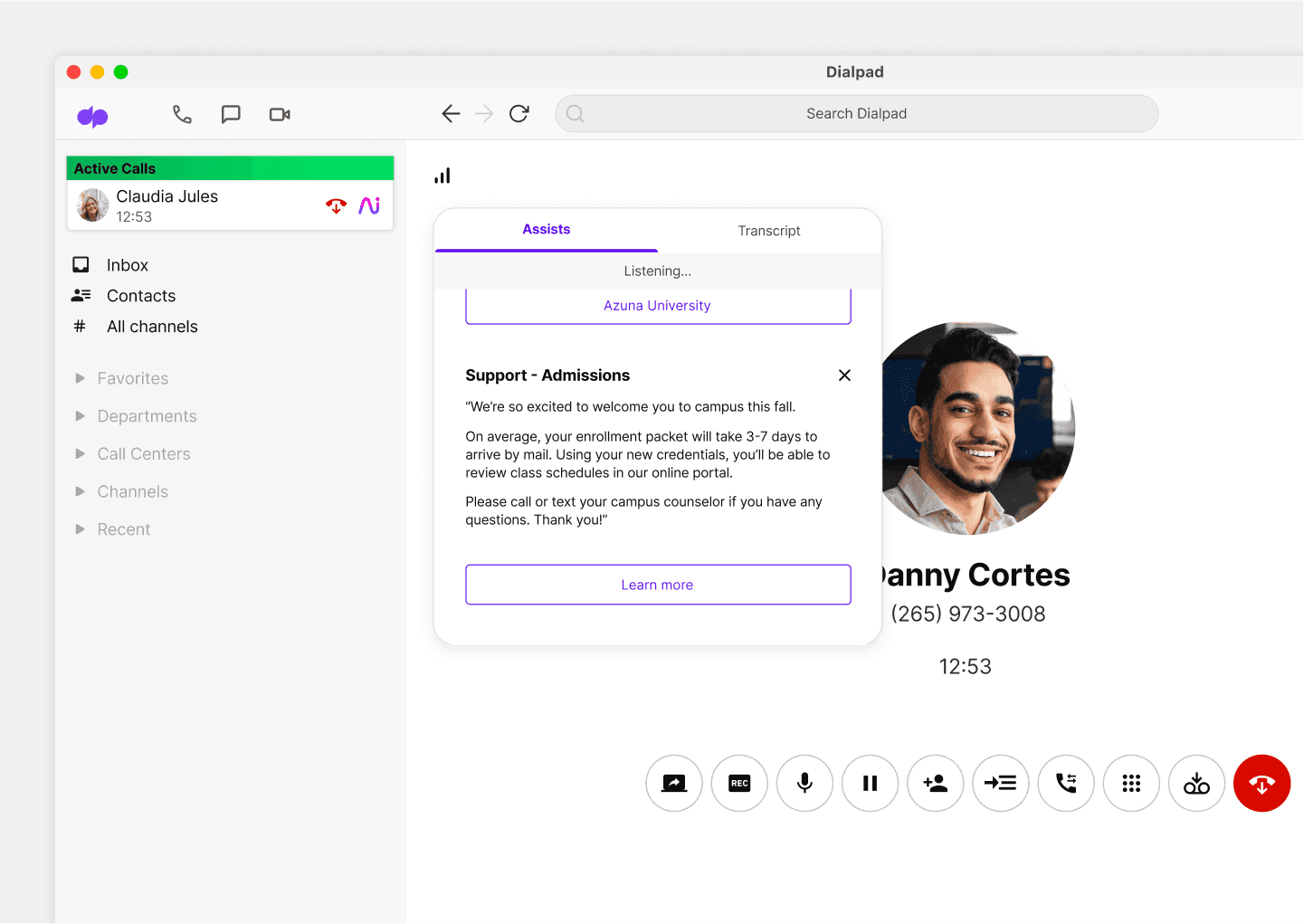Call escalation: What it is, how to handle it, and how to reduce the number of escalated calls

Principal Account Executive, Enterprise at Dialpad

Tags
Share
Have you ever been on hold for twenty minutes, listening to Muzak, feeling more and more frustrated, only to have a customer support agent tell you that they can’t do anything for you until you’ve rebooted your router (and you’ve already done that twice) when you finally get a live human being on the line?
For the customer, this can be extremely frustrating. Unless the agent can solve this customer’s problem soon, this interaction may result in an escalation call. How escalated calls are handled can greatly impact the customer’s impression of the company. In a 2020 survey, Salesforce found that 89 percent of business buyers and 92 percent of consumers are more likely to make another purchase if they’ve had a positive customer service experience.
How should you handle escalation calls and provide exceptional customer service to satisfy an unhappy customer? Read on to learn more about escalation call meaning, call center de-escalation techniques, and how to handle escalated calls.
What is call escalation?
Call escalation is when a customer requests that their call be transferred from an agent to a supervisor in order to resolve his or her issue.
Common causes of an escalated call
Customers might request escalated calls for a variety of reasons. Escalated call requests can stem from the perceived inability of the agent to solve the issue, the agent’s lack of technical knowledge, the agent’s lack of authority to give the customer what they want, query complexity, or even just general caller frustration.
Call center de-escalation techniques: How supervisors should handle escalated calls
Proper call center training makes handling escalated calls easier to handle for supervisors. While there are standard de-escalation phrases call center supervisors can use to calm the customer down, they can also diffuse the situation in other ways.
In fact, the further along a customer is in the call center de-escalation process, the less likely they are to listen to whatever de-escalation script call center supervisors try to use. Therefore, supervisors should try to show empathy, practice active listening, demonstrate understanding of the issue, and stick to positive listening.
If the supervisor can combine these methods, they’ll improve their chances of providing the customer with a more positive interaction.
Show empathy
If the customer is frustrated by the first or even second agent in the call center escalation process, they are more likely to want to vent their anger on or argue with someone in a higher position in the company.
One way to de-escalate the situation is for the supervisor to show empathy when they receive an escalated call.
The customer should feel like the supervisor is genuinely invested in helping them. Phrases like “I can imagine how frustrating this must be for you” or “I’d feel the same if I were in your position,” combined with active listening, can serve to make the customer a little less frustrated.
Practice active listening
What is active listening? Active listening is when you concentrate, and are fully present, when someone is speaking so that you can analyze and process what they’re really saying.
If someone is frustrated, active listening and empathy makes them feel heard. If a customer asked for a supervisor because the agent didn’t understand the issue or didn’t properly empathize with them, active listening from the supervisor could improve their emotional state.
Demonstrate understanding of the issue at hand
Along with active listening, demonstrating understanding of the issue at hand should be an important action for supervisors in the call center escalation process flow.
When the customer has experienced call escalation, particularly more than once, they are already frustrated with the situation. If they’ve had to explain the situation again to every agent they’ve encountered before they get to the current supervisor, that’ll only add to their annoyance.
Therefore, if the supervisor can demonstrate understanding of the issue at hand, they can decrease the customer’s stress levels, show that they’ve done their homework and understand the situation, and are therefore qualified to help resolve the customer’s problem, boosting the customer’s confidence in the supervisor and the company.
Stick to positive language
Finally, the supervisor should stick to positive language when handling an escalation call. This puts both the supervisor and the customer in a positive mindset during the interaction.
Negative phrases like “I don’t know,” or “I can’t” don't inspire confidence from the customer in the supervisor’s abilities and could make the situation worse. Instead, phases like “Let’s see what we can do” or “let me get back to you” make the customer feel like you’re on their side and are willing to help.
How to handle escalated calls proactively: Establishing processes to follow
In addition to de-escalation techniques, every call center should have a call center escalation plan for escalation management. Establishing processes to follow when it comes to call escalation will help provide clear guidelines, decrease miscommunication among agents and supervisors, and increase the potential for positive customer interaction.
Establish an escalation management policy
Escalation management is a set of escalation procedures for resolving customer problems at the right hierarchical level. Call centers should establish an escalation management policy so that agents and supervisors are consistent in how complaints are resolved and all staff are on the same page regarding responsibilities and ownership of issues.
Create an escalation matrix or matrices
Call centers should create an escalation matrix or matrices to handle escalated calls. An escalation matrix streamlines the issue-handling process so that customer requests can be handled quickly and provides a structured framework outside of the de-escalation script call center agents receive.
Escalation matrices are a standardized roadmap that defines the paths and criteria for escalating calls, including the order of departments and personnel to contact when a ticket is issued, as well as the timing of escalation to a higher level.
When creating an escalation matrix, call centers should include the point of contact at different levels, the timeline for escalating to a higher level in the company, how specific problems should be tackled in terms of responses, and what triggers a move to the next tier of the call center escalation plan.
Identify the individuals or teams to handle escalations
Along with an escalation matrix, call centers should identify specific individuals or teams to handle escalated calls. These could be teams with specialized knowledge or experience handling angry customers, e.g., particularly patient individuals, or supervisors who are particularly good at call center de-escalation techniques.
Best practices to prevent or reduce the number of escalated calls
Now that we know how to handle escalated calls, we’ll discuss the best practices to prevent or reduce the number of escalated calls you receive. The best practices below teach you how to best support your agents so that they can resolve a customer’s issues efficiently and without needing to resort to call escalation.
Give agent onboarding and coaching the attention it deserves
As unlikely as it seems, the popular adage, “Give a man a fish, and you feed him for a day. Teach a man to fish, and you feed him for a lifetime” applies to the good old escalation call as well. If your agents receive the proper onboarding and coaching they need to do their job efficiently, you could reduce the number of escalated calls that your supervisors need to take.
If your frontline agents can resolve a customer’s problem with enough technical knowledge that they don’t need to escalate a call or they can de-escalate a situation without needing a manager because they were given enough coaching and onboarding, they can be self-sufficient from the get-go.
Support your agents with the right tools and resources
Along with spending time investing in agent onboarding, if you support your agents with the right tools and resources, you’ll be surprised to find that they can accomplish more in preventing escalations.
If your agent has access to a company knowledge base, faster tools, escalation matrices, etc., he or she might be able to resolve a customer’s problem without needing a supervisor’s intervention or help, making the customer happier to have their problem resolved immediately and giving the supervisor more time to work on other important tasks.
Leverage contact center AI to improve customer experience
One way you can support your agents is to leverage contact center AI to improve customer experience. Real-Time Assist allows supervisors to help new agents by creating real-time assist cards that pop up on agents’ screens with relevant information for certain topics that are triggered by keywords or phrases:

If an agent is stuck or confused, supervisors can create a customized card with notes that appear so that supervisors can help them on the spot.
Supervisors also get a real time update to the conversation for full-context so that they can support agents through particularly tricky conversations.
While contact center AI supports agents in navigating conversations, they also improve customer experience. When agents are confident and knowledgeable, customers are happier because their problems are resolved efficiently and with minimal pain and frustration.
Avoid and handle call escalations with Dialpad
Call escalation is stressful for everyone. While escalation matrices and de-escalation techniques can help resolve escalated calls, the best way to handle an escalation call is to avoid having one.
With Dialpad’s contact center AI, you can prevent or reduce call escalations. If your call does become an escalated call, Dialpad’s real-time assist can help you help your agents resolve the issue before it needs to come to you.
Converting any customer is difficult and making a frustrated customer into a happy one is even harder. Let Dialpad’s AI solutions help you handle your calls so they never become escalated calls in the first place.
Need a better way to handle call escalations?
See how Dialpad Support can help you better handle and even reduce call escalations. Book a demo, or take a self-guided interactive tour of the app on your own first!
